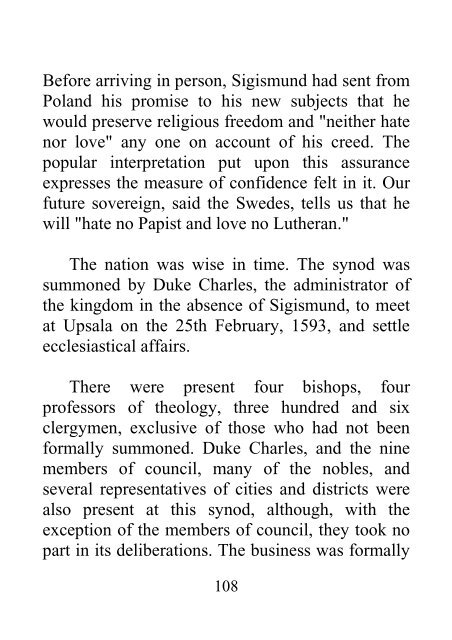Protestantism in Sweden and Denmark - James Aitken Wylie
Create successful ePaper yourself
Turn your PDF publications into a flip-book with our unique Google optimized e-Paper software.
Before arriv<strong>in</strong>g <strong>in</strong> person, Sigismund had sent from<br />
Pol<strong>and</strong> his promise to his new subjects that he<br />
would preserve religious freedom <strong>and</strong> "neither hate<br />
nor love" any one on account of his creed. The<br />
popular <strong>in</strong>terpretation put upon this assurance<br />
expresses the measure of confidence felt <strong>in</strong> it. Our<br />
future sovereign, said the Swedes, tells us that he<br />
will "hate no Papist <strong>and</strong> love no Lutheran."<br />
The nation was wise <strong>in</strong> time. The synod was<br />
summoned by Duke Charles, the adm<strong>in</strong>istrator of<br />
the k<strong>in</strong>gdom <strong>in</strong> the absence of Sigismund, to meet<br />
at Upsala on the 25th February, 1593, <strong>and</strong> settle<br />
ecclesiastical affairs.<br />
There were present four bishops, four<br />
professors of theology, three hundred <strong>and</strong> six<br />
clergymen, exclusive of those who had not been<br />
formally summoned. Duke Charles, <strong>and</strong> the n<strong>in</strong>e<br />
members of council, many of the nobles, <strong>and</strong><br />
several representatives of cities <strong>and</strong> districts were<br />
also present at this synod, although, with the<br />
exception of the members of council, they took no<br />
part <strong>in</strong> its deliberations. The bus<strong>in</strong>ess was formally<br />
108

















